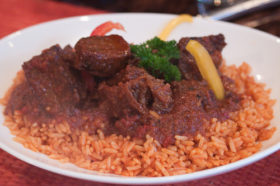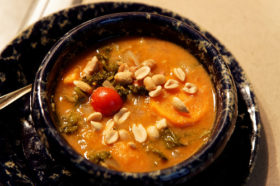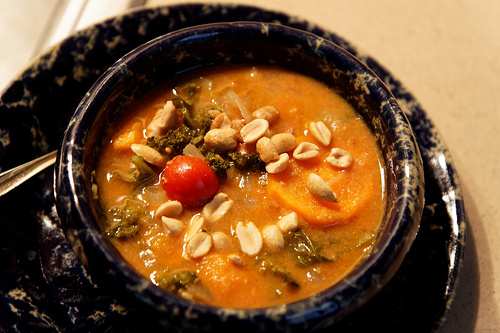The year is 1985 and somewhere in the United States, Michael Jackson, Lionel Richie and a posse of their pop star chums huddle into a studio to sing for Africa’s supper.The song is the heart-stirring We Are the World.
Recorded to raise funds to aid citizens of a drought- and poverty stricken Ethiopia, the charity song du jour was accompanied by pictures of desperate-looking African others and ash-skinned children with torsos as thin as spaghetti, very large heads and bones you could count one by one. These were not just people in need of a meal; they were so starved they barely had the strength to breathe, let alone muster the strength to wave away the flies that congregated on their mouths.
There was famine in Africa. So God bless the pop stars.
More than 20 years later those images seem to have raised more ignorance than consciousness. Because, years later, people still perceive Africa as the starving continent. So much so that pop tart Mariah Carey once said she wants to visit Africa, if only for the circumstantial dieting that would be bound to succeed.
Meanwhile, the news that I was planning to travel to West Africa was met with concern by family and friends that I would be afflicted with all sorts of diseases or even starve, though some in my circle seemed to feel that it would help me to shed the excess weight I have carried all my life.
Indeed, after spending a year and five months in West Africa, I am 40kg lighter. But it was not from starvation.
On the contrary, West Africa turned out to be the land of plenty food. There is food around the clock here: from the street chow standard of rice and meat sauce to kebabs, braai meat, fried fish, chips and plantain. The region has so much food, I began to feel as though I was starring in Supersize Me: West Africa.
In Senegal I piled on the lard by way of schwarmas and the nation’s beloved and addictive rice and fish dish, tcheip djenne.
Mali has as many braai and roastmeat outlets as it does mosques. And here, people will chase you down the street to invite you over for lunch. Though polite, Malians do not take no for an answer. They also do not accept that you have had enough to eat unless they see you flatten the mountain of food they put in front on you.
In Burkina Faso tasteless local food forced me into a staple of fried chicken and chips.
This was a mere five weeks into my trip and already I was starting to swell up.
Then came Ghana with its jollof rice, a rice-and-bean dish called waatchi, fried rice and much more that I was only too happy to sample.

On to Abidjan in Côte d’Ivoire. It is said West Africans spend a whack of their money on clothes and food. Ivorians are over the top in this regard with Abidjan being Frenchspeaking West Africa’s capital of food, booze and partying. Here, everyone who sells food does it around the clock. And it is not just your standard kebabs and sandwiches.
Some nightclubs have fully fledged outdoor restaurants. And if a plate of grilled chicken and attieke (cassava) are not your thing, take a few steps on to the streets and you can have even more of food you would never associate with a post-clubbing binge, like pork stew.
I was now six months into my trip. My French was starting to pick up. So I could at last understand what Salif Keita was saying in his song Africa. The song is a declaration of the good times that are rolling in our continent, which he reiterates by stating “manje beaucoup” (“eat lots”). He then has a verse in which he lists some of West Africa’s culinary delights, including tcheip, fufu, alloko, yassa, peanut-butter stew and attieke, which also doubles as a breakfast staple served with fried fish, raw chilli and a splash of oil.

I was in trouble.
I even started wishing that there was some truth in the prevailing stereotype of Africa being the land of starvation.
I had to act. This journey started in April 2009. The results have convinced me that anyone with lots of lard to push and some cash to spare should indeed head to West Africa.
The region has hundreds of robust traditional dances and I started to learn them on a rooftop in Bamako.
Thinking I was alone in fighting my lard, I was wonderfully surprised when a teenage girl walked up to me to offer her services as a “jogging partner”.
There is also zero privacy here. So my afternoon dance sessions were a daily spectacle for the neighbourhood, which made people offer tips and encouragement at every turn.
Random strangers in Guinea, Conakry, Ghana, Togo and Benin, where I was scattering my fat, had advice to offer. The region is obsessed with fitness. Noting a fat person attacking her lard, people would invite me to play beach soccer, join their troupe for an afternoon, tell me where to find fresh produce and offer me their kitchens so I could cook my own food.
They turned into a colony of personal trainers and gatekeepers I had to account to. Especially the children. They demanded that I spend many hours chasing after them or teaching them dance routines that they already knew better than me.
I left South Africa open to the journeys that I knew would come out of the act of booking my ticket out of the country. Yet losing weight was far from my mind. And it struck me, as the kilos started peeling off, that Africa is indeed the land of clichés.
The most enduring are of Africans as loving, humane and selfless.
My waist is a case in point.
Lerato Mogoatlhe is a South African journalist travelling around the continent. This post was first published in the M&G newspaper.


